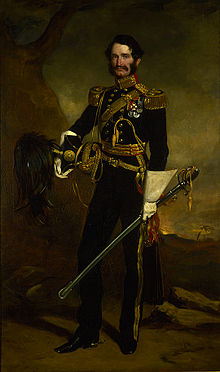James Hope Grant
| Sir James Grant | |
|---|---|

Portrait of Grant by his brother Francis Grant, 1853
|
|
| Born | 22 July 1808 |
| Died | 7 March 1875 (aged 66) |
| Allegiance |
|
| Service/branch |
|
| Years of service | 1826–1875 |
| Rank | General |
| Commands held |
Commander of British Troops in China and Hong Kong Madras Army Aldershot Division |
| Battles/wars |
First Anglo-Chinese War First Anglo-Sikh War Indian Rebellion of 1857 Second Anglo-Chinese War |
| Awards | Knight Grand Cross of the Order of the Bath |
General Sir James Hope Grant, GCB (22 July 1808 – 7 March 1875), was a British Army officer. He served in the First Anglo-Chinese War, First Anglo-Sikh War, Indian Rebellion of 1857, and Second Anglo-Chinese War.
Grant was the fifth and youngest son of Francis Grant of Kilgraston, Perthshire, and brother of Sir Francis Grant, President of the Royal Academy. He was uncle to sculptor Mary Grant.
He entered the British Army in 1826 as cornet in the 9th Lancers, and became lieutenant in 1828 and captain in 1835. In 1842 he was brigade-major to Lord Saltoun in the First Opium War, and distinguished himself at the capture of Chinkiang, after which he received the rank of major and the CB. There is a popular, possibly apocryphal, story that he was selected by Saltoun (a keen violinist) because he wanted a 'cellist to accompany him and Hope Grant was the only officer he could find who played the 'cello. In the First Anglo-Sikh War of 1845–1846 he took part in the battle of Sobraon; and in the Punjab campaign of 1848–1849 he commanded the 9th Lancers, and won high reputation in the battles of Chillianwalla and Guzerat (Gujarat).
...
Wikipedia
